General
First Mak@100 Lecture Examines Governance of Public Universities
Published
4 years agoon
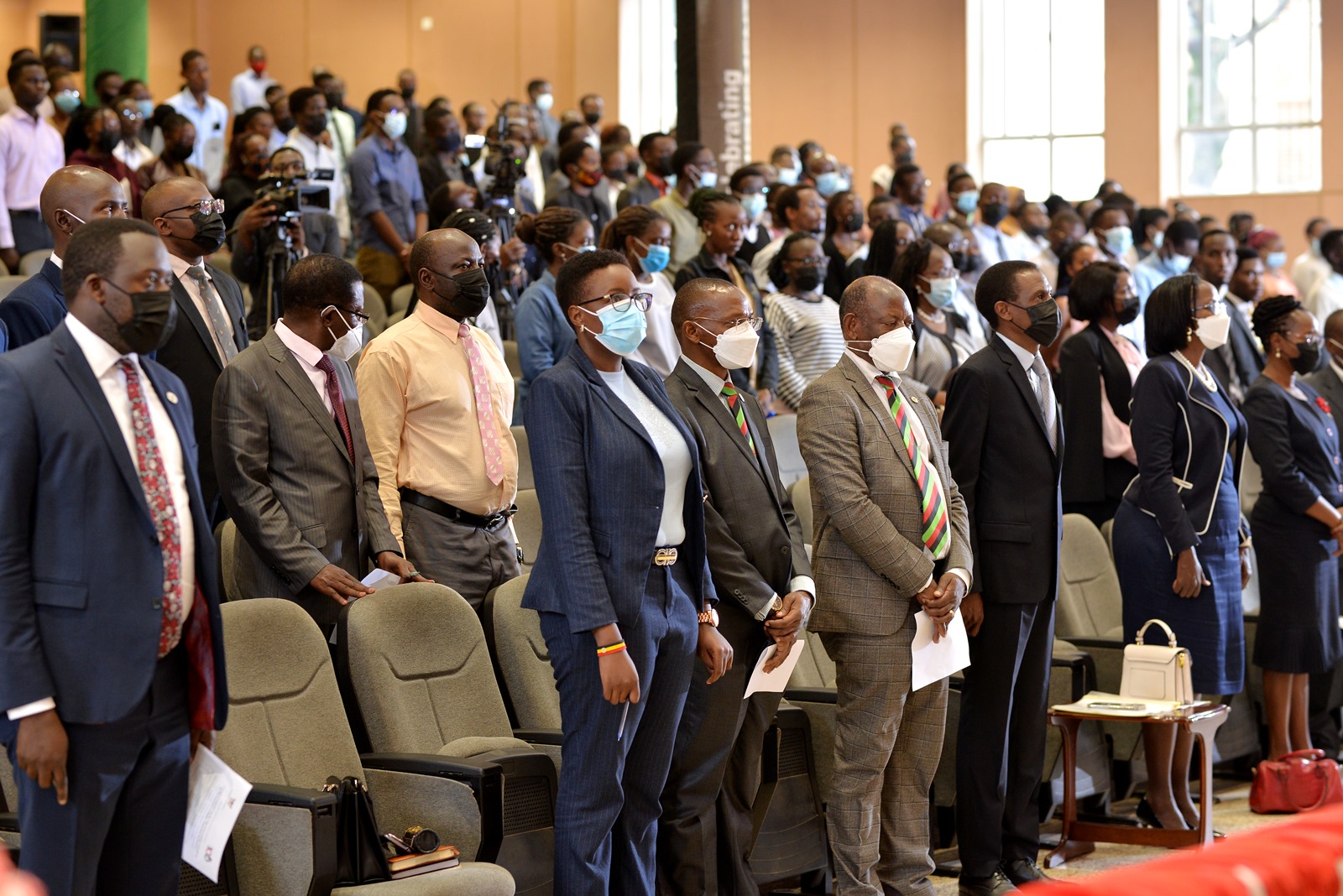
The Makerere@100 Lecture Series got off to an exciting start on Wednesday 9th February, 2022 with an eminent alumnus and Attorney General of the Republic of Uganda, Hon. Kiryowa Kiwanuka delivering an excellent exposition of the theme “A Legal perspective on the role of Governing Councils in the Management of Higher Education Institutions”.
Delivered to a packed but SOP-observant audience in the Central Teaching Facility 2 (CTF 2) Auditorium as well as hundreds online, the first series could best be described as historic; the first to be delivered by a sitting Attorney General of Uganda.
“It is therefore a privilege for me to moderate this public lecture not only as a lawyer but also as the Principal, School of Law” remarked the Event Chairperson, Prof. Christopher Mbazira. “We know and the Attorney General knows that his role as Head of Bar comes with various responsibilities, key among which is to mentor lawyers and ensure that the law is practiced according to professional standards and codes of conduct,” he added.
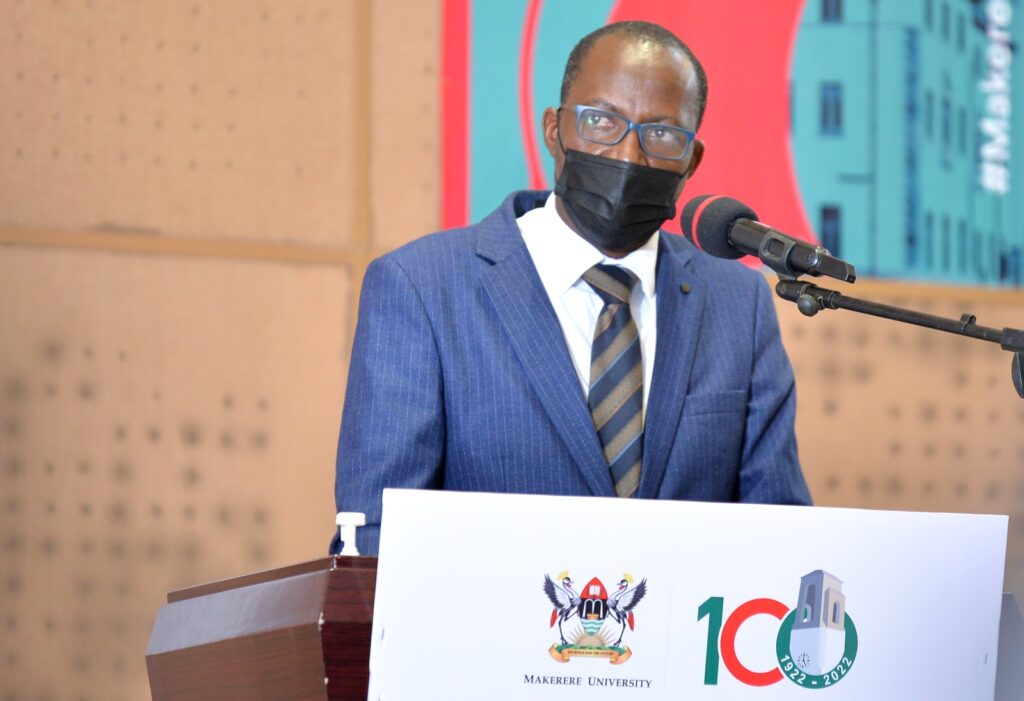
Prof. Mbazira thanked the Attorney General for using the lecture as an opportunity to discharge part of his duties as Head of Bar and informed the audience that as Principal, he had made a conscientious decision to cancel morning classes at the School of Law so that his students could attend the lecture, “because as I Law Student I never got that opportunity.”
The Principal invited the Attorney General to take keen interest in the quality of legal education offered at the School of Law, particularly the unique innovation of offering of Legal Aid services.
“We invite you to take interest in that as we wait for the promulgation of the Legal Aid Bill, as well as use your offices to ensure sustainability of that innovation by having that particular aspect of the School of Law incorporated in the Justice Sector” added Prof. Mbazira.
The Vice Chancellor, Prof. Barnabas Nawangwe in his welcome remarks noted that in addition to being the first Makerere@100 Lecture Series, it was the first time the Attorney General was delivering a lecture at his alma mater.
“The Lecture is on a very important subject to Makerere University and all other Higher Education Institutions because the Council is the supreme governing body of the institution. We therefore thank Honourable Kiryowa Kiwanuka for accepting to come and deliver this lecture despite his very busy schedule” added the Vice Chancellor.
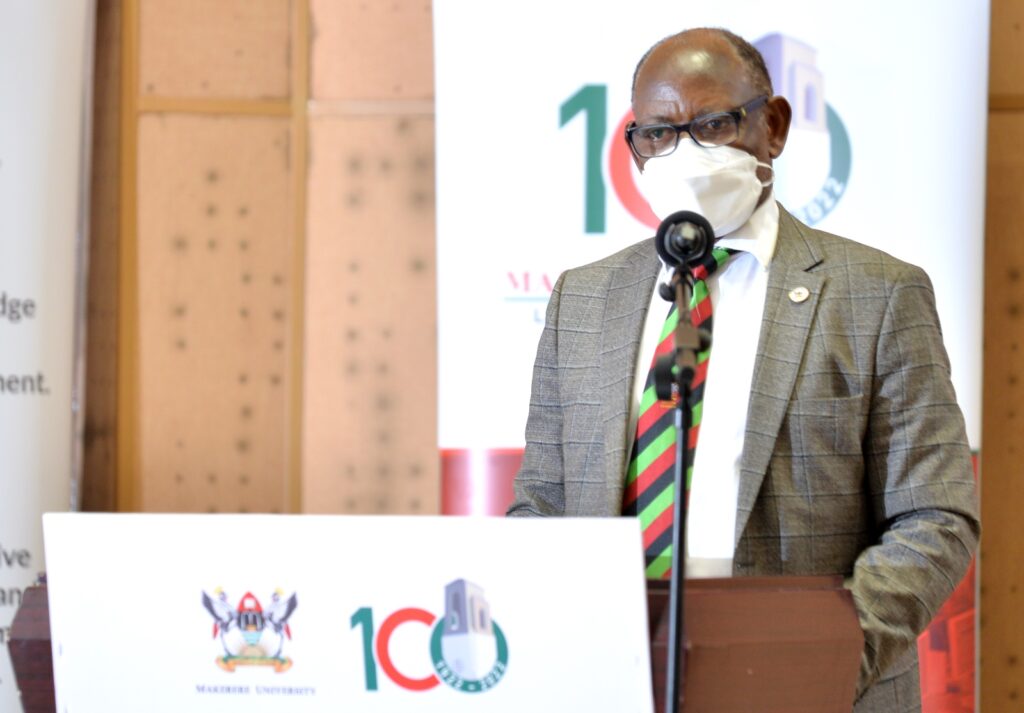
Prof. Nawangwe noted that the First Lecture would be followed by others in the lead-up to the climax of the Centenary Celebrations in October 2022. He thanked Prof. Mbazira for enabling his students to attend the historic lecture delivered by one of their own and Senior Counsel.
The Chairperson of Council, Mrs. Lorna Magara in her motivational statement prior to the lecture noted that there was no better person to deliver the First Makerere@100 Lecture Series than Hon. Kiryowa Kiwanuka.
“He has experienced firsthand the intricacies involved in the Governance of an educational institution of the magnitude of Makerere University” said the Chairperson, before adding that “Makerere University significantly benefited from Honourable Kiryowa Kiwanuka’s extensive legal experience, his willingness to lead; his quick incisive thinking and relentless ability to find solutions to multifaceted issues.”
Mrs. Magara further stated that the Lecture would double as an opportunity to officially bid farewell to Hon. Kiryowa Kiwanuka who served the Council from December 2018 to October 2021, as well as Her Worship Doreen Nyanjura who served from July 2016 to January 2022.
“As Chairperson, it’s been one of those bittersweet moments bidding farewell to two extremely resourceful Council Members, and yet at the same time, finding great joy in seeing them take on greater responsibility to serve our Nation and our City. I heartily congratulate you Hon. Kiryowa Kiwanuka and Your Worship Doreen Nyanjura both upon your respective appointments” she added.
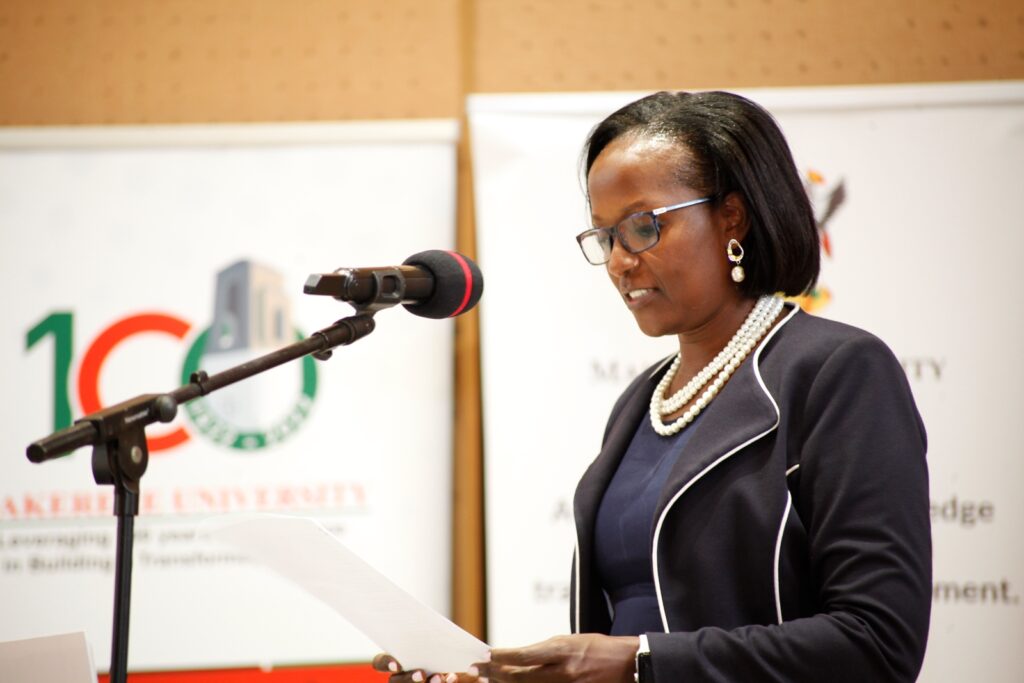
Quoting Barry Posner and James Kouzes’ book “The Leadership Challenge” wherein they state that the domain of leaders is the future, Mrs. Magara emphasised that Makerere as it celebrates 100 years of achievements must leverage its wealth of intellectual and human capital to profer leadership in transforming Uganda, “and it starts with good governance, undergirded by a proper legal framework.”
‘Cometh the hour, cometh the man’ is an idiom more popularly used in sport to describe the sportsman/woman that turns the tide of what hitherto seemed like an impossible score to recover from. Although no stranger to sport, Hon. Kiryowa Kiwanuka in this case had to deliver on a theme that was not only broad but also largely dependent on a legal framework; The Universities and Other Tertiary Institutions Act, 2001, that is in desperate need of amendment.
So palpable was the immensity of the task at hand that the Attorney General admitted “It’s not business as usual to deliver a public lecture like this, our business is normally behind the desk writing documents, so I’m really honoured to receive this recognition… it’s also interesting that I hear today, that this is the first lecture of the series, that I didn’t know, because if I had been told, maybe I would have had an excuse to take the second.”
He nevertheless noted that although the day’s theme sounded legal, what he was going to discuss was education, which would hopefully help the audience plan for a lifetime. He observed that “new” knowledge will be very instrumental as the country seeks to achieve Middle Income Status, which further underlines the importance of Makerere University and other institutions of higher learning, and their need to observe good governance.
Hon. Kiryowa Kiwanuka noted that the University Council derives its mandate from Sections 38(1) and 40(1) of the Universities and Other Tertiary Institutions Act 2001 and its functions from Section 40(2) of the same. He added that although the broad nature of the Council’s functions occasionally makes it hard to draw a line between its roles and those of Management, Council, being the Trustee of the Government wields overall responsibility to ensure effective and efficient management and functionality of the University.
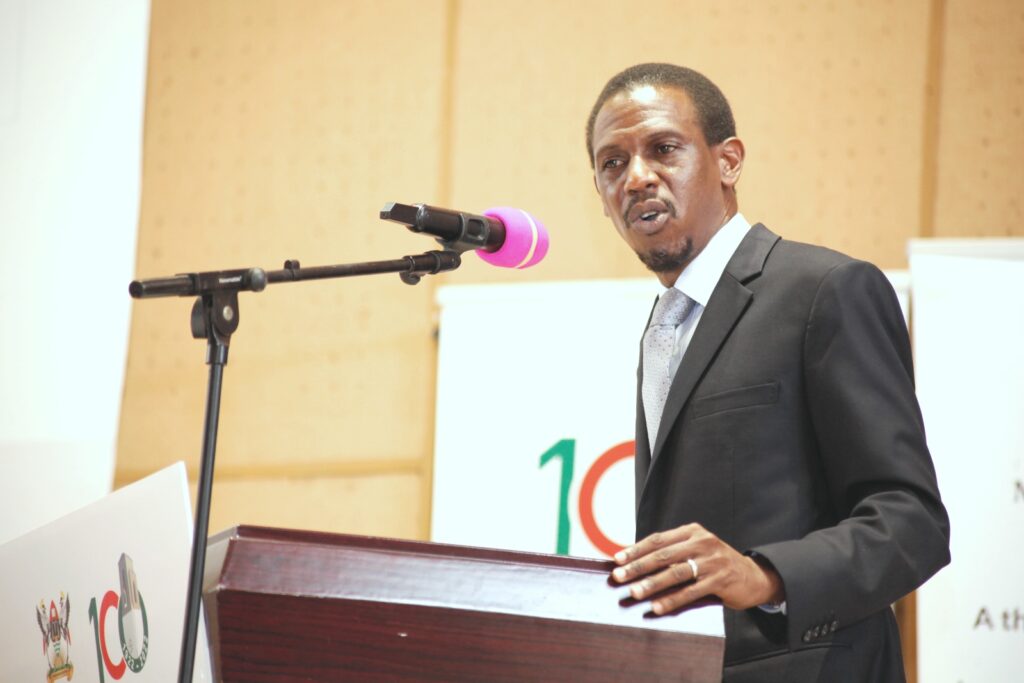
“The role of the university council is not simply to manage the institution but to manage change. We are surrounded by an ever changing environment. We are in the age of computers, social media, IT, artificial intelligence etc.” explained the Attorney General.
In this regard, he commended the University for adapting to the changing world. “Makerere University has identified the changing circumstances and the need for research in order for us to find homegrown solutions to our challenges and has decided to make this its primary goal. To become research led!”
After delving deeply into the specific and routine responsibilities of Council such as: Making recommendations for the appointment of the University’s top leadership; Establishing the University Senate and other Academic Bodies; Establishing Boards of Faculties, Institutes and Colleges; Appointing Committees of the University Council; Management of University Property; and Submitting University Budget Estimates, Hon. Kiryowa summed it up by saying there is no point in the management and running of the University where Council does not have a direct role.
“University business is not ordinary business. The rationale of this is that the purpose of a University is for the greater good. The greatest stakeholder at least in Makerere University, is the people of Uganda; alumni, students or not. What you do here affects all of Uganda” cautioned the Attorney General.
University Councils face a number of challenges largely due to their size and flouting the Chatham House Rule. After enumerating these, Hon. Kiryowa concluded on a cautionary note, reminding his audience of the need to achieve a good balance between the Council and the Vice Chancellor/Management for the good of the university.
The risk, he noted, was in a proactive Chairperson and a proactive Council limiting the scope of activity for a Vice Chancellor. He nevertheless commended, “I have had the privilege of working with both a dynamic Chairperson and proactive Vice Chancellor.”
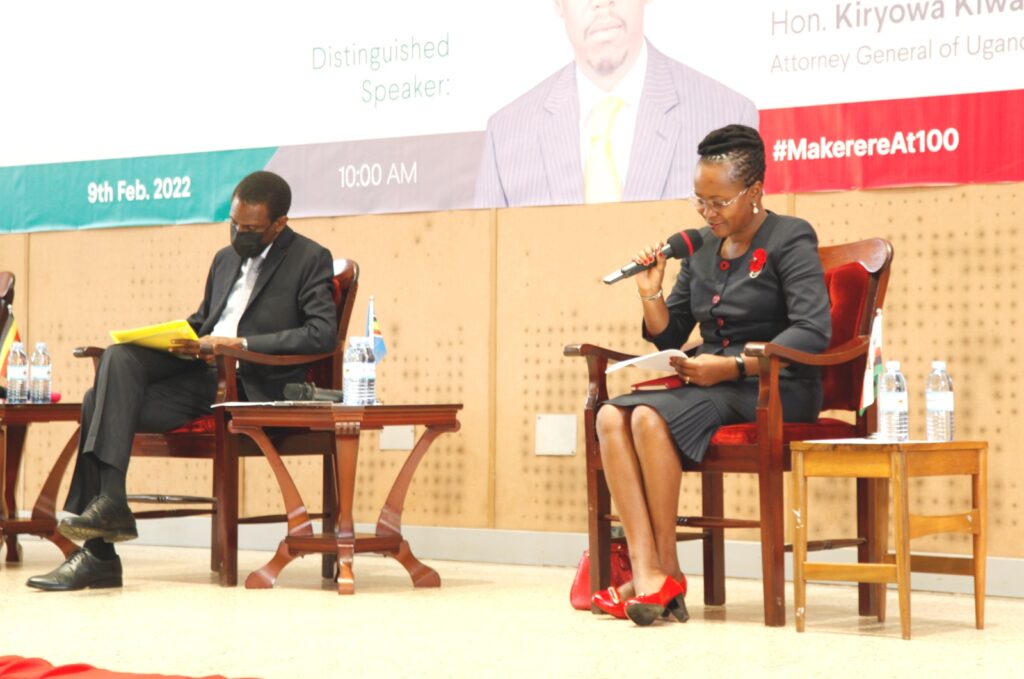
The well-received public lecture was followed by a lively one-on-one with the Attorney General, moderated by Assoc. Prof. Sarah Ssali a Council Member and Dean, School of Women and Gender Studies, College of Humanities and Social Sciences (CHUSS).
Pertinently raised were the need to: amend the Universities and Other Tertiary Institutions Act to move beyond the era in which Makerere was the only Public University in Uganda; and cater for affirmative action and minimum qualifications in the constitution of Council. Other burning issues touched on stifling academic freedom, losses to public universities arising out of litigation and the growing presence of the military in academic spaces. MakererePertinently raised were the need to: amend the Universities and Other Tertiary Institutions Act to move beyond the era in which Makerere was the only Public University in Uganda; and cater for affirmative action and minimum qualifications in the constitution of Council. Other burning issues touched on stifling academic freedom, losses to public universities arising out of litigation and the growing presence of the military in academic spaces.
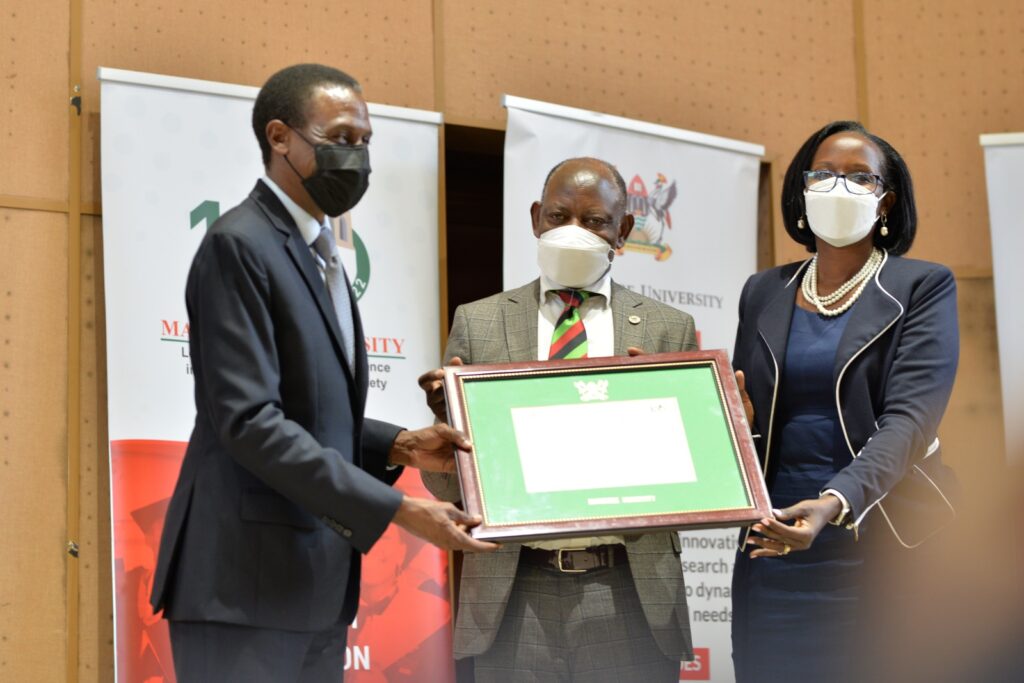
The Attorney General in summary concurred with the urgent need to amend the Universities and Other Tertiary Institutions Act as it governs a very dynamic era, proposing it be subject to amendment every ten years. He called for the adoption of a more inclusive “Ugandans in uniform” reference to the military, and offered to create a space for the public and academia to debate their growing presence in spaces outside their usual domain. Finally, he urged his audience not to use academic freedom to trample upon the freedoms of other members of the public.
As hinted on by the Chairperson of Council during her motivational statement, the lecture was crowned by the presentation of eminent service awards to Hon. Kiryowa Kiwanuka and Her Worship Doreen Nyanjura.
In her acceptance speech, Her Worship acknowledged that although she did not know what the future held as she journeyed from Nyamabuga village in Kyenjojo district to commence her undergraduate studies at Makerere in 2009, she carried in her heart a burning desire to make her surroundings a better place than she had found them. She went on to serve on the Students Guild and in 2016, became Councillor for Makerere University at the Kampala Capital City Authority (KCCA).
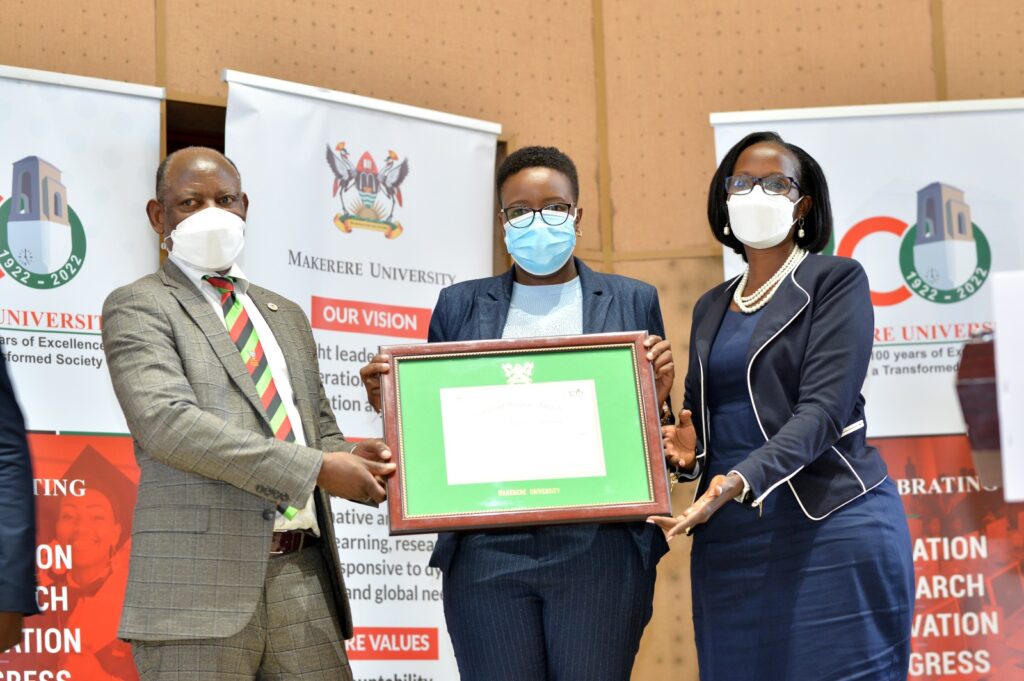
Nominated by KCCA to sit on the Makerere University Council in 2016, Her Worship was at the time of her departure in January 2022 serving her second five-year term.
“I want to extend my sincere gratitude to this Council and its members with whom I served. This University Council has groomed me, it has trained me and sharpened me to be a better leader. The Council has taught me that every single decision we take affects so many people and their families, a single decision could destroy a career or build it, it could shut out a whole section of our society from attaining an education or enable them to attain education” she said.
Please click the embedded video below to view proceedings of the First Makerere@100 Lecture Series
You may like
-


Meet Najjuka Whitney, The Girl Who Missed Law and Found Her Voice
-


Makerere University School of Public Health Graduates First Cohort of Cost-Effectiveness Analysis Short Course
-


Climate variability found to shape malaria trends in Yumbe District
-


Mak hosts First African Symposium on Natural Capital Accounting and Climate-Sensitive Macroeconomic Modelling
-


Uganda Martyrs Namugongo Students Turn Organic Waste into Soap in an Innovative School Project on Sustainable Waste Management
-


Olivia Nakisita and the Quiet Urgency of Adolescent Refugee Health

The 76th Graduation Ceremony of Makerere University will be held from Tuesday 24th to Friday 27th February, 2026. A total of 213 PhDs (87 female, 126 male), 2,503 Masters (1,087 female, 1,416 male), 206 Postgraduate Diplomas (80 female, 126 male), 6,343 Undergraduate Degrees (2,999 female, 3,344 male), and 30 Undergraduate Diplomas (9 female, 21 male) will be graduating from all the Colleges.
Ms. Sarah Aloyo and Ms. Nakato Dorothy both students of the Bachelor of Procurement and Supply Chain Management emerged as the best in the Humanities and Best Overall students with a CGPA of 4.93. Mr. Ssewalu Abdul, a Bachelor of Leisure and Hospitality Management student emerged second best in the Humanities with a CGPA 4.90. Ms. Esther Ziribaggwa emerged as the best student in the Sciences with a CGPA of 4.77 in the Bachelor of Agricultural and Rural Innovation, while Mr. Simon Mungudit emerged second best in the Sciences with a CGPA of 4.76 in the Bachelor of Science in Petroleum Geoscience and Production.
Commencement Speakers
- Day 1 – Prof. Nicholas Ozor, the Executive Director of the African Technology Policy Studies Network, Nairobi, Kenya
- Day 2 – Prof. Dr. Maggie Kigozi, Chairperson Makerere University Endowment Fund Board
- Day 3 – Dr. Patricia Adongo Ojangole, Managing Director, Uganda Development Bank Limited
- Day 4 – Ms. Reeta Roy, Former President & Chief Executive Officer, Mastercard Foundation
The 76th Graduation Ceremony will be held at the Freedom Square following the schedule below:
Tuesday, 24th February, 2026
College of Agricultural and Environmental Sciences (CAES)
College of Computing and Information Sciences (CoCIS)
College of Education and External Studies (CEES)
School of Law (SoL)
Livestream Link for Day 1: https://youtube.com/live/wVGPA0FJ9pU
Wednesday, 25th February, 2026
College of Health Sciences (CHS)
College of Natural Sciences (CoNAS)
College of Veterinary Medicine, Animal Resources and Bio-security (CoVAB)
School of Public Health (SPH)
Thursday, 26th February, 2026
Makerere University Business School (MUBS)
College of Business and Management Sciences (CoBAMS)
Friday, 27th February, 2026
College of Engineering, Design, Art and Technology (CEDAT)
College of Humanities and Social Sciences (CHUSS)
Institute of Gender and Development Studies (IGDS)
Makerere Institute of Social Research (MISR)
General
Mak Selected to Host Alliance for African Partnership Africa Office
Published
1 day agoon
February 23, 2026
Makerere University has been selected to host the Africa Office of the Alliance for African Partnership (AAP). The significant milestone that underscores Makerere’s role in fostering research, innovation, and global collaborations across the continent was announced at a meeting of the University’s Central Management with an AAP delegation on 23rd February 2026.
Makerere’s selection was based on the University’s robust commitment, alignment with the AAP’s Strategic Plan, and proven ability to manage consortium activities. The AAP, which was initiated by Michigan State University (MSU) in collaboration with Ten African Universities and agricultural policy research networks in 2016, targets critical challenges in education, youth empowerment, health and nutrition, agri-food systems, science and technology, water, energy, environment, and culture and society.
Addressing the delegation consisting of AAP Co-Directors from MSU, Dr. Jose Jackson-Malete and Dr. Amy Jamison, accompanied by newly-appointed Director of the AAP Africa Office, Dr. Racheal Ddungu Mugabi and Ms. Clare Cheromoi, the Vice Chancellor, Prof. Barnabas Nawangwe who appreciated the choice of Makerere to host the Africa Office said:
“One of the greatest challenges facing African universities is PhD training, particularly supervisory capacity. Through partnerships such as the Alliance for African Partnership we can leverage international expertise to strengthen supervision—whether through training supervisors or through joint supervision arrangements.”
Prof. Nawangwe equally applauded joint initiatives such as the Grant Writing and Publication project, which gave rise to the establishment of a Writing Centre that he said can be used to build capacity in AAP member universities with Makerere as the hub. Officially launched on 21st March 2023, the project is living up to its expectation of becoming a springboard for strong postdoctoral collaborative research for both institutions and other US universities.
Dr. Titus Awokuse, Vice Provost and Dean for International Studies and Programs at Michigan State University (MSU) who attended virtually, reiterated that Makerere’s selection reflects its long-standing commitment to advancing African higher education, research excellence, and meaningful global collaboration.
Reflecting on the origins of the Alliance for African Partnerships (AAP), Dr. Awokuse explained that nearly a decade ago, MSU initiated a transformative conversation in Atlanta centered on the question: How should we partner differently? From this dialogue emerged AAP—an Africa-centered consortium that now brings together 12 institutions across Africa and the United States.

He emphasized that AAP is grounded in equity, mutual benefit, shared leadership, and deep respect for African priorities and expertise. Since its founding, MSU has served as convener and key supporter, working with member institutions to strengthen research collaboration, promote faculty and student engagement, and address shared development priorities.
Dr. Awokuse underscored that AAP’s success is the result of collective vision and commitment, not the efforts of a single institution. He paid tribute to Lilongwe University of Agriculture and Natural Resources for hosting the Africa Office in its early years and acknowledged the foundational leadership of the inaugural Africa Office Director.
He described the launch of the Africa Office at Makerere University as a significant milestone that reinforces Africa-led leadership, strengthens regional collaboration, and enhances responsiveness to emerging opportunities. MSU, he affirmed, remains fully committed to AAP and to working closely with Makerere and all consortium partners to expand collaborative research, nurture the next generation of scholars, and advance Africa-led solutions to global challenges.
The newly-appointed AAP Africa Office Director, Dr. Racheal Ddungu Mugabi is a member of faculty in the Department of Development Studies, Institute of Gender and Development Studies. Her work on intersectional inequalities in Uganda and other Global South regions uniquely positions her to drive collaborative research and partnerships at the Africa Office.
Initially founded by ten African Universities and MSU, AAP now comprises eleven African members including; the African Network of Agricultural Policy Institutes (ANAPRI)-Zambia, Egerton University-Kenya, Lilongwe University of Agriculture and Natural Resources (LUANAR)-Malawi, Makerere University-Uganda, United States International University-Africa-Kenya, Universite Cheikh Anta Diop-Senegal, Universite Yambo Ouologuem de Bamako-Mali, University of Botswana-Botswana, University of Dar es Salaam-Tanzania, University of Nigeria, Nsukka-Nigeria, and the latest, University of Pretoria-South Africa.
These Universites collaborate under Focal Points to advance policy-relevant research and sustainable development. Makerere University’s Focal Point is Prof. Robert Wamala, Director of Research, Innovations and Partnerships (DRIP).
Addressing the University Management, Dr. Jackson-Malete outlined the African Futures Research Leadership Program, which nurtures early career scholars through mentorship and skill-building as one of AAP’s flagship programs. She noted that the Program that prioritizes female participants or men committed to promoting women in higher education has for the first time during its fifth cohort admitted the first male, Dr. Alfadaniels Mabingo from the Department of Performing Arts and Film, Makerere University.
The AAP Africa Office at Makerere will coordinate activities, boost research collaboration, mobilize resources, and enhance global engagements for socio-economic transformation. This aligns with Makerere‘s broader goals of leveraging international expertise to build resilient institutions.
View more photos from the event: https://flic.kr/s/aHBqjCLjoA
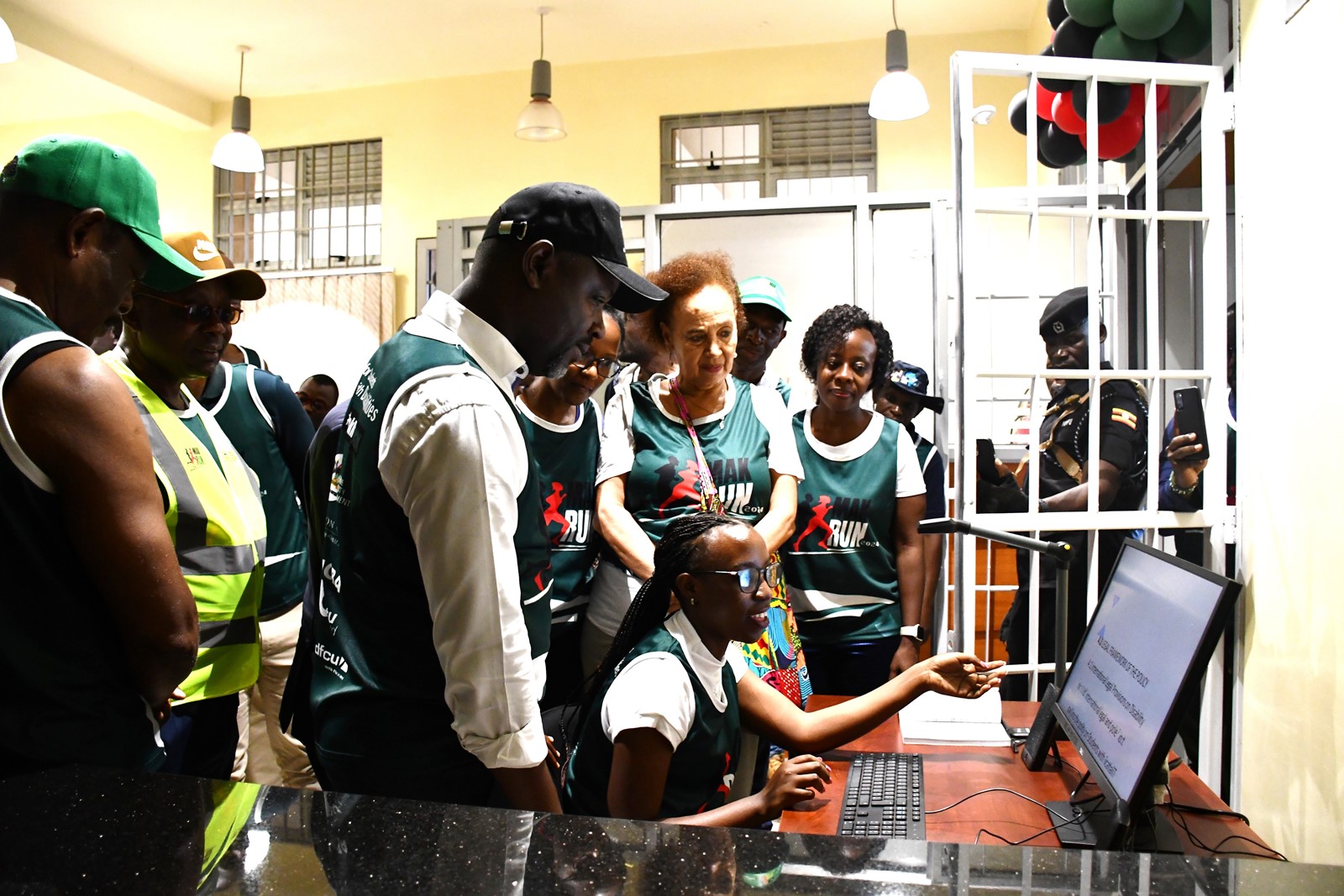
Students with disabilities at Makerere University have been requested to stop seeking for special attention and instead look for solutions and opportunities for personal growth.
This was during a mental wellness, inclusion and safeguarding session organized by the Dean of Students office and the Mastercard Foundation Scholars Program at Makerere University.
Addressing students on mental health and disability inclusion, Mr. Marvin Ggaliwango, a lecturer at the College of Computing and Information Sciences (CoCIS), noted that if the students stop complaining, they will become empowered to take charge of their own development, build resilience and engage confidently in both academic and social environments.
“Turn your lived experiences into tools for innovation. Stop complaining and start creating solutions for yourselves. You are the one living this life, and that gives you the authority to be an expert. When you develop a solution, it doesn’t just benefit you, it helps others too, by removing barriers,” Mr. Marvin Ggaliwango, said.
He encouraged students to see themselves not as victims of circumstance, but as active participants and co-creators of the inclusive environment they wish to experience.
“Learn how to communicate effectively and humbly. If you have a problem, express yourself clearly. Do not isolate yourself or feel resentful. You are not defined by disability, you may face disadvantages, but you still have ability,” he encouraged.
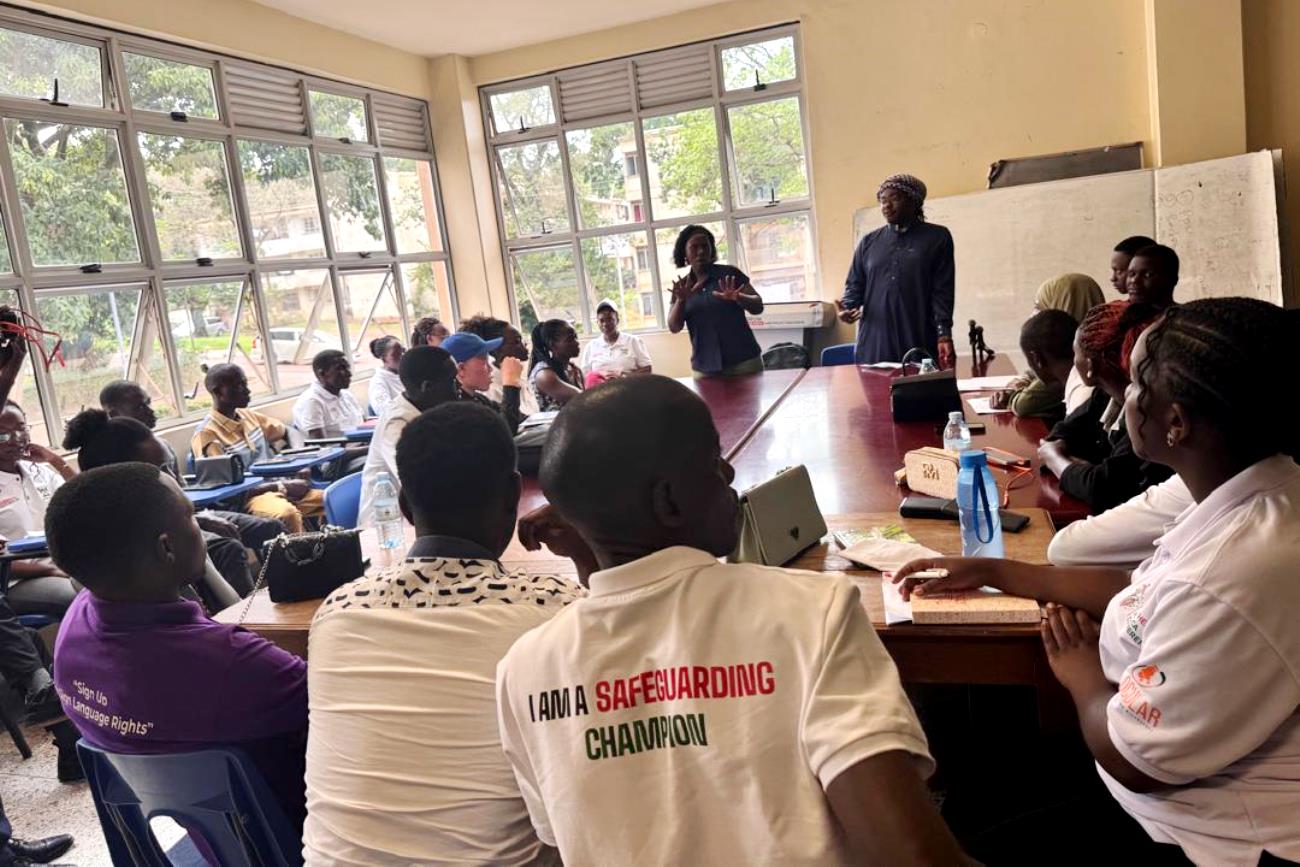
Throughout the session, students listened attentively as he emphasized the importance of self-awareness and personal responsibility, urging them to understand their strengths, acknowledge their limitations and take deliberate steps toward personal growth while contributing positively to the University community.
“We must enhance and ensure that our mental health is number one. Always choose yourself first. Choose what makes you happy and protect your peace. If you are at peace with yourself, your academics will improve. There is a strong link between mental wellness and academic success,” Mr. Ggaliwango, noted.
In his speech, Mr. Musa Mwambu, the Disability Inclusion Advisor at Light for the World Uganda, called upon the students with disabilities to enhance and ensure that their mental health is prioritized.
“As students living with disabilities, sometimes you over expect, because you have a disability you should be given, listened to and when people do not listen to you, you attribute it to your disability, get it from me, even those without disabilities are not listened too. Things are not happening to you because of your disability it is because of the world we live in. Everything that happens to you can happen to others,” Mr Mwambu, noted.
“Have fun with your life. Make yourself happy and be smart. Present yourself in public confidently wherever you go. The way you carry yourself can improve your mental health and how others perceive you,” Mr. Mwambu said.
He reminded the students that gaining admission to Makerere is itself a milestone.
“There are many people without disabilities who have never stepped at Makerere University. Find something that empowers you and hold on to it. You may have a physical impairment, but if you are brilliant in class, you can lead discussions and inspire others,” he added.

During the session, Dr. Rodney Rugyema, the Acting Principal Warden, welcomed the students back from the long holiday. He assured them that the University is committed to their safety and well-being while on campus.
Dr. Rugyema emphasized that the University has systems in place to protect students, both physically and psychologically and encouraged them to report any concerns promptly.
“When you are at the University, you are not on your own, we are always here for you. For us to engage you on mental wellness and inclusion, we want you to be in the right state of mind, whole and complete,” Dr Rugyema, said.
He added: “We are here to empower you and we are calling upon you not be a risk for yourself and always be able to detect risks that are likely to affect your mental health and works towards avoiding them and reporting them to ensure that the University manages them before they escalate into real harm whose impact is more serious than you can think,”
During the session, Ms. Diane Nabikolo Osiru highlighted the University’s broader commitment to safeguarding.
Safeguarding at Makerere University refers to measures put in place to promote safety and wellness of all students, staffs and other stakeholders.
“At Makerere University, safety is not a luxury for few. but it is a right for every student. As the semesters begins, we are urging you to learn how to identify signs of harm or abuses and report them to the appropriate safeguarding contact points,” Ms Nabikolo, said.
For support in case of any harm or abuse, International and Refugee Students, can access support through the Advancement and International Office, while Students with Disabilities, can utilize the Disability Support Center. Those with personal and emotional challenges, can visit the Counselling and Guidance Centre.
In his speech, Dr Joab Agaba, a Lecturer in the College of Computing and Information Sciences, guided students how to report risks and incidences to the MakSafeSpace, the e-reporting platform complimenting the other University traditional reporting channels.
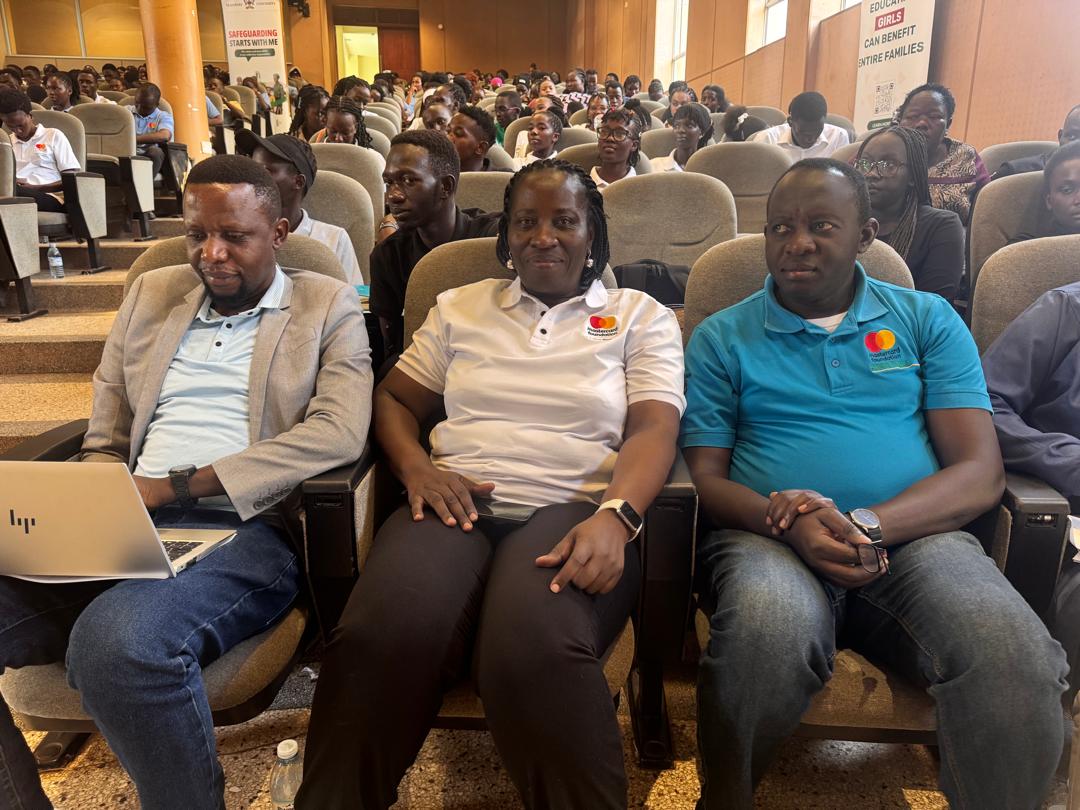
Mr. Henry Nsubuga, the Manager of the Counselling and Guidance Center, shared practical strategies for coping with stress effectively including time management, setting realistic goals, seeking support from peers or counsellors.
Students speak out
Shanitah Nahamya, 2nd year student of the Bachelor of Adult and Community Education
“I have learned how to respectfully and appropriately engage with students with disabilities. In the past, I often felt pity when I encountered them, but now I understand that what they need is not pity, it is respect, support, and equal opportunity.”
Guo Dorothy Geri, 1st year student of the Bachelor of Commerce
“I have learnt how to use inclusive language. Before offering help to a student with a disability, I will first ask them, because not all the time do they need our help. You might think someone wants to be helped to cross the road, yet they are waiting for someone.”
Valentines Doris Aduka, 1st Year student of the Bachelor of Biomedical Science
“I have been calling students with disabilities special names, thinking it was kind. But I have learned that they do not want to be treated differently or labeled in a special way. What they value most is being treated like everyone else, with respect, dignity, and fairness.”
Trending
-

 Humanities & Social Sciences1 day ago
Humanities & Social Sciences1 day agoMeet Najjuka Whitney, The Girl Who Missed Law and Found Her Voice
-

 Health6 days ago
Health6 days agoUganda has until 2030 to end Open Defecation as Ntaro’s PhD Examines Kabale’s Progress
-

 Agriculture & Environment4 days ago
Agriculture & Environment4 days agoUganda Martyrs Namugongo Students Turn Organic Waste into Soap in an Innovative School Project on Sustainable Waste Management
-

 General6 days ago
General6 days agoMastercard Foundation Scholars embrace and honour their rich cultural diversity
-

 Health2 weeks ago
Health2 weeks agoCall for Applications: Short Course in Molecular Diagnostics March 2026
